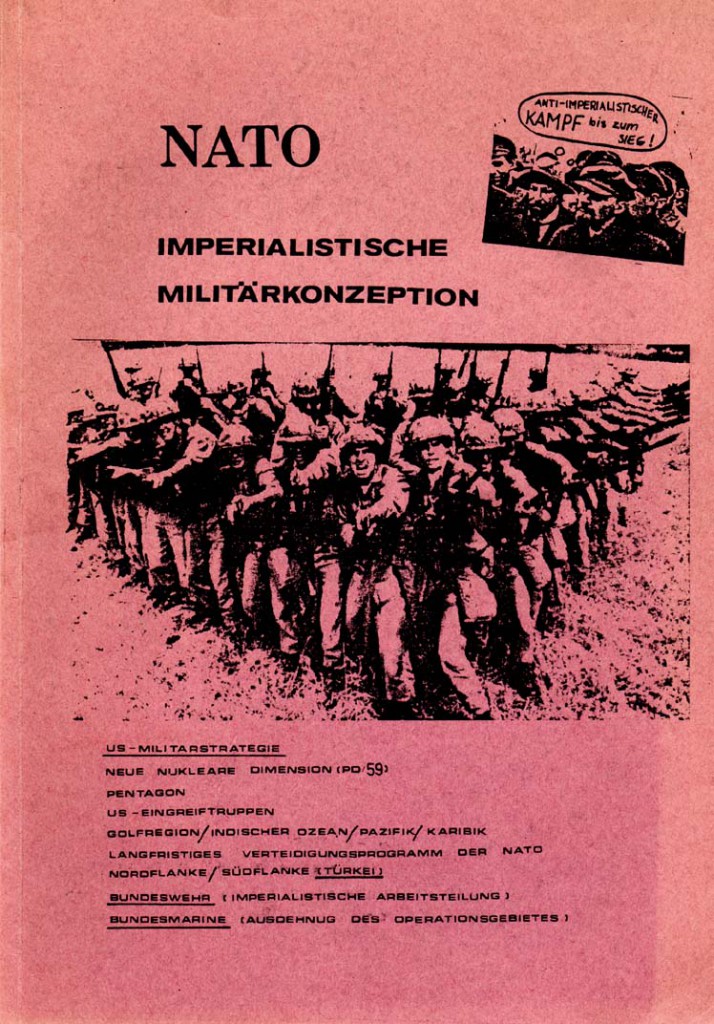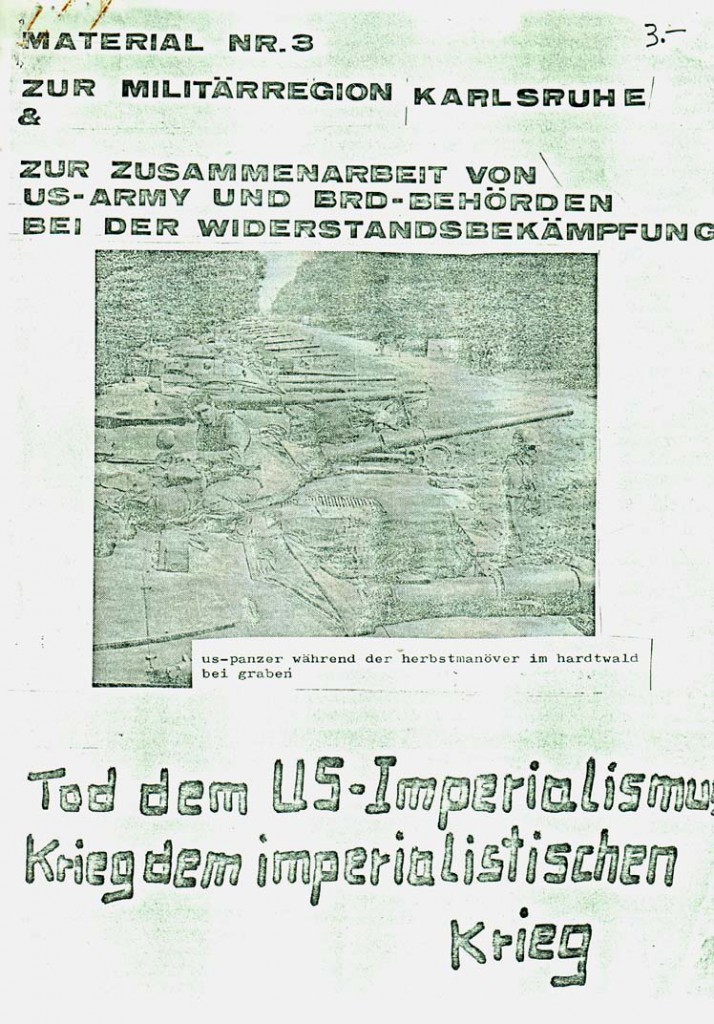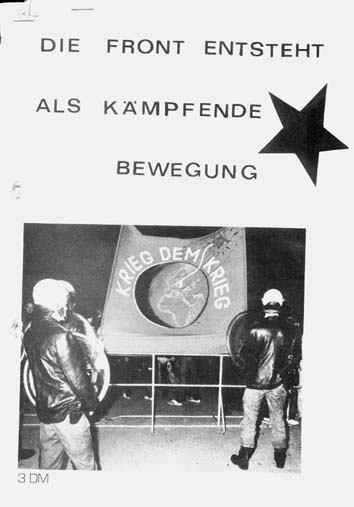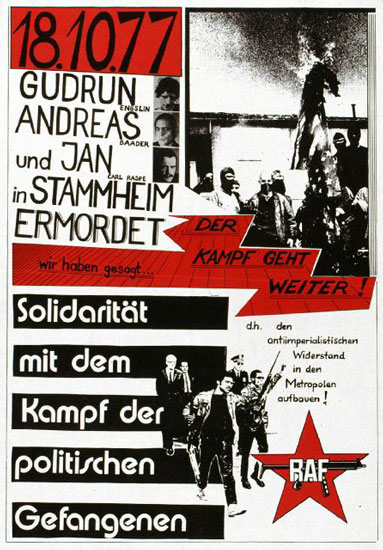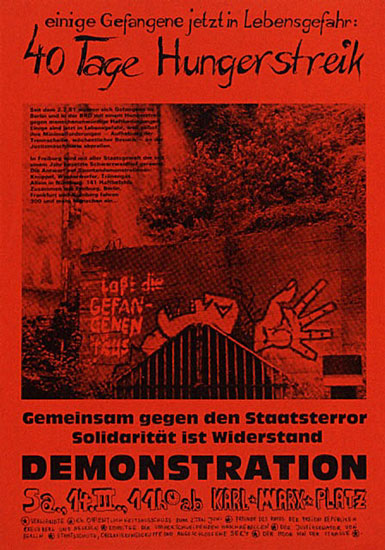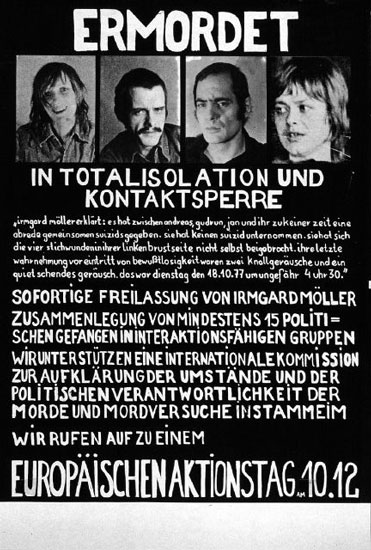War on Imperialist War —Women Against Imperialist War (Hamburg)
[ Prairie Fire Organizing Committee translation included in War on the War Makers: Documents and Communiques from the West German Left 1983 pp20-27]
The mistake is believing that there might be someone fighting out of the experience of weakness; but someone who fights, somewhere, at some time knew strength, experienced it himself, otherwise he would not be fighting. —Gudrun Ensslin
We, Women Against Imperialist War, are part of the women’s movement and the battles that have developed since the militant demonstration against NATO on the 6th of May, 1980, in West Germany. We have had a snout full of being reduced as women to our “natural abilities,” namely those of peacemaker, eternal mother and social workers who make peace between incompatible opposites. We are no “Women for Peace” because we see that here and everywhere in the world we cannot conjure up peace and that there will be no peace unless we fight the material causes for war and destroy them.
In this article we want to discuss the theories and the strategies of the peace movement as exemplified in such slogans as “Make Peace Without Weapons” and “West Germany Out Of NATO,” which we think to be incorrect and leading in the wrong direction. We think it is senseless to inundate politicians, the same politicians who are helping to prepare for war, with moral appeals. We think it is hopeless to use peaceful protest and civil disobedience to stop the war machinery of imperialism—the war machinery that tries with all its resources to find a way out of the current crisis even at the cost of destroying the entire human race.
It is our aim to discuss the conditions and perspectives of our resistance, which we feel brings us together and strengthens us. When we say “War On Imperialist War!” we mean we have not only the threat of a Third World War before us, but that we must also fight for the overthrow of the system which is already, all over the world, either overtly or covertly waging war against people who resist its power. And we must also fight the so-called “normal” conditions of living, the deadly isolation of people from each other, and a permanent state of war. We as women are confronted with these conditions all the time
IMPERIALIST WAR IS THE STRATEGY OF THE RULING CLASS TO OVERCOME CRISES
We know from the history of this country that the imperialist system needs wars to maintain its profits. In this century, both the world wars and fascism have shown us that the capitalists are not afraid to use any means necessary to broaden their possibilities of (surplus) accumulation. Inevitably when a crisis of capitalism can not be controlled by normal methods such as increased political repression and economic exploitation (automation, unemployment, reduction of workers’ benefits and social welfare programs), the system resorts to military violence.
That is how in 1930 the big crisis in Germany and Italy led to fascism and finally to the beginning of World War II. It was in the interest of the leading German capital, which had fallen into a crisis, to destroy the national borders created by the Treaty of Versailles, to regain territory and to expand their capitalist influence through a world war.
Fascism, which meant the violent restoration of the “inner peace” in Germany after the years of crisis between 1929 and 1933, was a necessary basis for the planning and the execution of the six years of World War II. German fascism was crushed by the allied forces in 1945, but by no means did they destroy the conditions that bred fascism. On the contrary, the capitalist class of the victorious powers found new, wider possibilities for expansion.
Although World War II was extremely devastating, both in terms of human lives and destruction of property, out of the rubble capitalism experienced the biggest boom of its history under the direction of the U.S. Thus, the West German welfare state thrived.
The state of West Germany was built up in 1945 by U.S. occupation with the help of the Marshall Plan. The West German state did not make a break with fascism. It continued with the same relationship to the means of production, the same state apparatus, the same power elite, and the same methods of fighting resistance as fascism. This did not occur in opposition to, but in conjunction with American interests. Under the threat of military repression, the Allied forces occupying West Germany, especially the Americans, put forth their interest in conditions of production that were based on capitalist ownership, in opposition to the majority of the German people.
The threat of military repression against any form of resistance to the politics of the occupying nations was one side of the German restoration; the other side was the regrowth of the economy. Under the guise of humanitarianism for the poor, suffering German people, the European Relief Program, the Marshall Plan which was actually part of the U.S. strategy against the U.S.S.R., was declared in 1947. The Marshall Plan
• guaranteed the expansion of U.S. economic influence in Europe
• was the foundation of the military and political integration of Western Europe into the anti-communist bloc
• facilitated, through the control of the German economy by U.S. capital, the Americanization of European societies, especially West Germany, by American capital, American technology and American consumer culture. Thus the “American Way of Life” was imported as an unquestionable prototype.
Part of the rebuilding that was part of the restoration of capitalist conditions in this society was the destruction of any radical opposition from its very beginning. The elimination of any radical opposition (the German Communist Party, communist trade unions) and the integration o f resistance into the Social Democratic Party were the main objectives, in the years following the “economic wonder,” for the installation of a model of democracy, a model in which the theory, the official line, was that all classes more or less took part in the economic growth. Any questioning of the “growth pact” between workers and capitalists was suppressed. And it was fought as being a danger to democracy and the well-being of the people.
The conception of “inner peace” (loyalty of the general population) and the growth of the economy which determined the atmosphere of the 60s and 70s was dependent upon continuous expansion of capital. So the development of a world market was not only an economic, but a political necessity in order to keep the people in the metropolises quiet through increased consumption and a constantly rising standard of living.
The development of a world market meant exploitation of the Third World by an international division of labor. Thus, the development of the metropolises took place on the backs of the Third World countries. In the 60s many countries of the Third World began liberation wars against exploitation by multinational corporations dominated by U.S. capital, thus bringing to an end the expansion of imperialism for world power.
IMPERIALISM CAN BE DEFEATED
The victory of the Vietnamese people, who waged a difficult, determined struggle and finally succeeded in getting the Yankees out of their country, was the hope and example for many liberation movements. The major significance of the victory of Viet Nam was the proof that it is possible to fight the monster U.S.—that it is vulnerable and that it is possible to defeat it. In the last ten years liberation movements all over the world have pushed the Americans back, most recently with the expulsion of the Shah and his clique from Iran.
Every revolutionary struggle for liberation is able to weaken imperialism, which is dependent on natural resources and labor power as well as political stability in the Third World. Most obvious is the Middle East, a region which, because of its rich oil fields and strategic military location, has been declared by the Americans as part of their “vital interests,” and which they are ready to defend with all their military means.
The impending stationing of new middle-range missiles in Europe, aimed at the USSR, is thus intimately connected to the Third World and to the interests of the imperialist states in preventing revolution. The U.S. hopes to scare the USSR into stopping its support of liberation movements in the Third World, thus clearing the way for undisturbed intervention in the Third World countries when they attempt liberation from imperialism. Inherent in imperialism is the calculated risk of the destruction of all life in Europe, and the nuclear contamination of West Germany.
But imperialism knows its vulnerability; it sees itself on the defensive. The crises are worsening here in Europe, in its centers, as imperialism is no longer able to carry out its plundering wars. The more the crises develop in the centers, the more the resistance grows against this system that is based entirely on destruction, and the more imperialism looks to a military solution for its crisis—it is not only looking for an external military solution, but also an inner military solution against the resistance within the metropolis itself.
The military “solution” which has been prepared for by the U.S. and West German imperialists since 1945 and strengthened in the last ten years can be seen in the development of NATO and the history of remilitarization of West Germany, and in the growth in the last ten years of a social democratic government and of repressive measures by the state….
The following short description of the history of NATO makes clear that the American strategists built up and structured West Germany and Europe as the bastion of American imperialist interests. And it also shows the extreme importance of military planning and the buildup of armaments in so-called peace times. One couldn’t state this any more clearly than Haig:
Military power is a vital prerequisite for a coherent strategic forming of international relations. Soon after WWII we recognized this connection. We wanted to rebuild and protect Europe with all our available resources—political, military and economic. The results were the methods that led to NATO and the economic recovery of Europe.
INTEGRATION OF THE FRG INTO NATO—THE FIGHT AGAINST THE RESISTANCE
The new German army has not been founded to guarantee the safety of the state of Bonn; rather, the new state has been founded to be able to build up a new army against the Soviet Union.
Rudolf Augstein, 1955
The decision in the 1950s to set up a West German military contingent was not a decision made by an independent West German government. On the contrary, the creation of the West German army had been decided under the military dictatorship of the occupying forces. The government of the FRG had no other choice but to formally give its consent to this project. There was no real option to rebuild without rearmament. Germany had been given formal sovereignty in 1955 on the condition that it would integrate into NATO.
The strength of the troops to be brought up by the FRG had already been decided in 1952 in Lisbon, at a time when the FRG was not yet formally part of NATO. In 1956 the first units were set up, armed with American weapons and under American control. Before that, a West German military contingent had been built up secretly by the American military secret service in connection with the West German secret service.
The military part of the Marshall Plan not only included sending American arms and equipment into the FRG until the end of the 1950s, but also building up an infrastructure that was designed according to military interests. For example, no industrial zones were established close to the border with the German Democratic Republic during the phase of reconstruction.
There is another example that clearly shows that the founding of the FRG was closely linked to its integration into NATO: the FRG is by contract bound not to withdraw its military contingent from NATO, as other countries of the alliance have done in the past.
The FRG also consented to not having its own military leadership within the West German army. The existence of such an independent leadership would make possible the existence of a West German army outside the NATO alliance. In the event of war the commanding officer of NATO is also the commanding officer of the West German army.
The fact that the FRG is one solid U.S. base with over 100 U.S. bases on its territory shows that the territory of the FRG is functioning for U.S. interests. Wars against the Third World are planned and carried out from the territory of the FRG.
• During the Viet Nam war, the headquarters in Heidelberg coordinated the flight of the B-52 bombers against the Vietnamese National Liberation Front.
• GI’s for the Rapid Deployment Forces are stationed here.
• The runways for the U.S. military transport airplanes are situated in this country. The Americans launched their intervention in Iran in May 1980 from Ramstein, West Germany. Ramstein and the runway West in Frankfurt are going to be used by the Americans as a launching base when their vital interests are endangered in the Near East.
• The NATO long-term program decided on in 1978 called for enlarging the airports in Hamburg, Frankfurt and Munich.
The U.S. bases in the FRG have extraterritorial status. The government of the FRG has no rights in them. As they are institutions of an occupation army, they have their own court system and their own military police. For over 30 years now the Americans have stationed their own criminal police in the FRG and these police, besides their military tasks, also carry out secret service activities, such as the observation of West German citizens. In order to “protect their interests,” the U.S. forces act autonomously.
That means that they are directly engaged in the fight against resistance in the FRG. For us that means that as our resistance more and more directly targets the U.S., we are going to be confronted not only by the German pigs and the German secret service, but also by American counter-insurgency specialists.
• American anti-guerrilla units that used to be stationed in the Panama Canal Zone are now being used against the resistance in Europe.
• Six American and also German anti-terror specialists were sent to Italy right after the kidnapping of NATO General Dozier by the Red Brigades.
• CIA agents took part in a demonstration of squatters in Berlin in order to study the structure and strategies of different groups.
• Everyone who takes part in actions and demonstrations against NATO and the U.S. has his/her data put into the computer at the Heidelberg headquarters.
• According to the operation plan 101-1, which has been forced upon the members of NATO by Washington, the American Commander-in-Chief in Europe is entitled to undertake his own actions ofrepression when there is “internal unrest” in the FRG. According to this plan, black lists have been established in all the countries of NATO. These lists contain the names of all the people that are to bearrested by the U.S. military police in time of civil unrest
THE “SMALL WAR”— COUNTERREVOLUTION
It is not the only task of NATO to plan and carry out strategies for an imperialist attack on the Third World or the Soviet Union. It is also the task of NATO to create and to guarantee the conditions for such an attack: the inner stability in the countries within the alliance, the quiet hinterland for imperialist wars of aggression.
Shortly after he came into office, U.S. Secretary of State Alexander Haig described this task as the mostimportant: the fight against “international terrorism.” Concepts for the international fight against resistance are worked out between the U.S.A. and Europe. During the last ten years the FRG (Federal Republic of Germany) has been foremost in the establishing and pushing through of projects designed for the fight against and the smashing of resistance in Western Europe.
The former chief of the Federal Investigation Bureau (BKA), Herold, built up the BKA and the whole apparatus of the police into a gigantic apparatus for the fight against resistance. His declared aim was to start an offensive against terrorism. Herold once characterized the fight between revolutionary guerrilla movements and the imperialists, with their strategies for defeating resistance, as the “small war” that has pushed into the background the “big war” among states, the global fight among alliances and blocs of powers.
Everyone waging resistance in this country is experiencing the “small war,” is feeling that the state has declared war on them. It is important for us not to be afraid of such a declaration of war, but to take it up: angrily, with the will to attack, joyously and seriously.
Saying: I do not like this or that, that’s protest. Seeing to it that what I do not like does not happen any more, that’s resistance. —Ulrike Meinhof
In order to clarify the conditions for the development of our resistance, we have to go back to the history of the FRG and we have to take a close look especially at the time after World War II, when U.S. capital and the U.S. government set the lines for the reconstruction of this country.
If we want to become a real power against this state, a power that is able to make it impossible for the U.S. imperialists and their allies to use their war machinery, we have to know the foe we are fighting. We have to know this in order to be victorious
FRG—JUNIOR PARTNER OF U.S. IMPERIALISM
We have to recognize that the FRG is no sovereign country, that in the phase of the reconstruction this country has been so invaded by U.S. capital that an economic dependency and political cooperation have been established that make it impossible to divide the FRG from the U. S. A. In this the FRG is not just a victim of U. S. interests but, as a strong imperialist power, is itself actively taking part in securing and enlarging the imperialist regions of power.
The FRG is part of the global fight between the proletariat of the world and imperialism. There is a political,military, economic and ideological identity of interest with U.S. imperialism and so the FRG is no oppressed nation but one that oppresses other nations. The FRG has been established by the CIA and by U. S. capital as a stronghold against communism and as a strategic base. In this function the FRG today, as part of the states aligned to the U. S. A., is a strategic subcenter for U.S. foreign policy, a policy that is conceived of as the world’s home policy.
That means that the FRG is the operational base for American capital in this region. The FRG is a leading imperialist power in Western Europe, a power that is organizing Western Europe into a political, military and economic bloc of power. —Quote from the declaration made by Rolf Heisler during his trial in September 1981
The demands being made by a large part of the peace movement neglect this reality. These demands do not exemplify that the FRG, or better, German capital and the ruling class, are part and parcel of transnational capital under the hegemony of the U.S.A. These demands neglect the fact that the FRG is part of NATO and that those in power know that they can only realize their interests together with the Americans.
If the German people were to say, “We want to leave NATO!” they would, on oneside, be confronted with the interests of their own imperialist ruling class, a ruling class that does not want to leave NATO and that cannot leave NATO. They would also be confronted with the interests of the Americans who did not build up this country for the last 35 years just to give it up again if the German people thus wish.
OUR ROLE IN THE STRUGGLE: TO FIGHT IMPERIALISM
In the FRG there is not a question of national liberation, because this country is a leading imperialist power and, as a nation that oppresses other nations, cannot just leave the imperialist war plan, cannot be neutral. The international contradictions, the war between imperialism and the peoples in the Third World fighting for liberation, are gaining in sharpness.
At the same time it is becoming obvious that there are only two possibilities in the world: either you are an ally of NATO or you are NATO’s enemy. There is no third way in between. Neutrality does not exist. It is not in our interest to keep ourselves out of this conflict, hoping perhaps that then the bombs might not fall on us. It is our aim to smash NATO, to liberate ourselves and all people in the world from imperialism.
We are only able to do this together with all the peoples in the world. It is because of this that we think it a scandal that at the peace demonstration in Bonn on the 10th of October, 1981, the representative of the ANC (African National Congress) who was to speak in the names of numerous liberation movements (PLO, SWAPO, FDR, Polisario, Unidad Popular) was forbidden to speak because the people who had organized the demonstration were fearing for the good image they had with the federal government and the fascist regime in Israel. The speech that was going to be given exactly states what the situation is now:
Peace for us means the end of everyday oppression, the end of unfair structures, the end of hunger, the ending of the terror of the ruling classes. The liberation movements make up the first rows in the frontline in the fight against the aggressive war-threatening policy of the U.S.A. Our people every day are risking their lives in the fight for peace and justice. They are paying a high price with their blood. The peace movements in the FRG and in Europe and the liberation movements in the Third World have to walk hand in hand.
We, the peace movement, the anti-imperialist movement and the women’s movement can learn a lot from the liberation movements for the fight against our common enemy. The liberation movements did not only experience how imperialism defends its total power in the world with murderous brutality. They have also experienced that one can nevertheless defeat this enemy if one does not have any illusions about it, if one declares war on it, if one attacks it materially in a revolutionary war for liberation that has to be fought on all levels, politically and militarily.
Our sisters in the liberation movements are an example for us, because they have won for themselves the means to attack imperialism and to defeat imperialism. They are not out to win “free zones” for themselves as are some women in the women’s movement in the metropolis. They are fighting for their freedom within the fight for liberation.
The Red Army Fraction (RAF) began taking up armed anti-imperialist struggle in this country ten years ago. In their attacks, like, for example, against the U.S. headquarters in Heidelberg in 1972, they have developed a practice that brings the war of liberation into the metropolis, into the hinterland of imperialism. It is a practice that sees itself in concert with the liberation movements by attacking the common enemy in the “heart of the beast” (Che Guevara).
When we got together as “Women Against Imperialist War” two years ago, it was very important for us to discuss the politics of the RAF and of the prisoners from the RAF. It was our aim to develop a new political offensive out of the women’s movement, a movement most of us came from. An offensive that brings our fight against male violence and male supremacy together with our fight against the state and imperialism. We knew that we did not wish to create for ourselves quiet islands within the system, because doing that would mean not to attack male violence and the state, not to abolish it, but to just bypass it.
This is why RAF politics is so important to us: the comrades from the RAF and their politics do not bypass reality, do not bypass imperialist structures of violence, do not bypass alienation. This is because it is a politics that does not lie and deny reality by making compromises, that does not align itself with the system, but takes the perspective and possibility of liberation from imperialism, our liberation as people, very seriously and fights for it radically. The fact that continuously, for ten years, the RAF has attacked American bases and strategists, as well as the figures representing this state, did not only show us that this state can really be hurt when attacked. Most of all it has shown us the possibility to free ourselves from alienated structures of passivity and fear, to develop a revolutionary identity and power.
This possibility is clearly shown by the fact that the RAF does not let the fight be determined by repression. It means that they themselves determine strategic attacks and that they themselves determine when and where the confrontation is going to be. On the 6th of May, 1980, in Bremen, we ourselves had the experience of wanting the confrontation and of determining it and of thus becoming stronger.
We did not only protest the public taking of an oath by soldiers; we also militantly attacked those preparing for war. What was so important about the stones and the molotov cocktails that flew about was that they expressed a new quality of resistance: someone who throws stones does not enter anymore into a dialogue with the rulers, expects nothing from them, determines the confrontation himself, does not want integration. What was new about the resistance in Bremen was that, for the first time, anti-imperialist groups and anti-militarist groups came together and it was the beginning of a broad mobilization against NATO.
THE IMPORTANCE OF THE RAF PRISONERS’ HUNGER STRIKE
The anti-imperialist mobilization was continued during the last hunger strike of the prisoners from the RAF. It was a hunger strike that was aimed at winning the demand for association for many prisoners that have been isolated for years. The anti-imperialist mobilization was continued during the strike and gathered strength because our resistance outside the prisons came together with the fight of the prisoners. In this fight our relationship to the prisoners was no longer one of just support. We felt that it was a fight we were fighting together. In fighting with the prisoners for their association—for their possibility to continue to collectively fight and work within the prisons—we have tackled our own fear of prisons.
We have done something in order not to let our perspective and power end before the prison walls. In dealing with our fears, we have realized where our power lies: When the militant left learns what imperialism had to recognize in its defeats, namely, that its power ends where its violence is feared no longer, they will have solved the whole problem of imperialism’s invincibility.
—Hunger strike declaration by the prisoners from the RAF
The strong mobilization for the hunger strike has forced the state to make concessions. It was our mistake not to really realize our power We could not estimate how much the state tears the different movements coming together. We did not really realize how the state has to fight even the beginnings of such a development of unified structures, contexts and perspectives among us. We did not realize this and so we stopped our fight with the ending of the hunger strike. We did not force the state to implement the concessions it had made.
But despite our mistakes we have made during the hunger strike, we have nevertheless learned what is important for our resistance and how to go on. The resistance during the last year here in the FRG has shown the rulers that the time when they could carry out their projects without being hindered is over: the militant fights of the squatters in Berlin, the numerous demonstrations and actions of the peace movement, the demonstration against Haig in Berlin, the determined resistance of the people fighting against the NATO runway in Frankfurt.
What really shook the pigs was that in this situation, where not only in the FRG but in the whole of Europe, resistance against imperialism is developing and coming together, where more and more people realize who the enemy is and that you have to attack it, that in such a situation the RAF attacked the U.S. headquarters in Europe in Ramstein and the NATO high commanding officer, U.S. General Kroesen.
This has shaken the pigs, because the mass resistance against the war preparations and the armed attacks of the guerrilla have come together. The Red Brigades in Italy few weeks ago kidnapped NATO General Dozier under the same slogan the RAF had in the attack against Kroesen: War on Imperialist War! The Red Brigades have called for a unified struggle of the Red Brigades, RAF, IRA, and ETA against U.S. imperialism.
TO WANT REVOLUTION IS MORE THAN A PHRASE
We have felt during the last year that to want revolution is more than a phrase, that it is more than just an analysis of imperialism. To want revolution above all means: wanting to change yourself and others, breaking with structures and roles that have been especially forced upon us women. It means realizing that personal and political liberation can only be won together, that personal liberation is the condition, necessary for political liberation and vice versa.
The motor for our resistance is the experience that we can overcome our fears, the knowledge and the consciousness that we can change weaknesses into power, that we are no longer just suffering our fate but are subjects of our thinking, acting and feeling. Women’s liberation means the fight for self-determination and subjectivity, means turning around the experience we had as women to be at the bottom, defined by weakness, alienated from ourselves. It means turning these experiences around into collective power, by putting our whole self against the rulers, against institutions and institutionalization, against oppression, against chauvinism. It means becoming a real force that is able to do away with imperialist rule and power.

